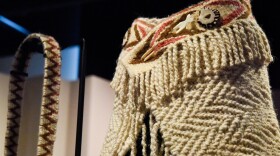Megan Asaka's new book examines the role that Asian immigrants and Indigenous workers played in the first several decades in Seattle's history.
Asaka grew up in a Japanese-American family in Seattle and she often heard about how "progressive" the city was, even after many Japanese people who called the Pacific Northwest home and operated businesses in the city lost everything when America was drawn into World War II.
“And that never sat well with me because my family experienced mass removal and incarceration in 1942,” Asaka said. “And then when they returned to Seattle, they really had nothing and had to start over and the city didn't even really want them back. And so that really stayed with me.”
She's now a history professor at UC Riverside. Her book Seattle from the Margins: Exclusion, Erasure, and the Making of a Pacific Coast City was released in September by the University of Washington Press.
In it, Asaka explores Seattle's early economic history, dating back to the 1860s when Chinese immigrants and Indigenous workers labored in the hops fields, bolstering the region's first major agricultural industry.
Immigrant groups, including a growing number of Filipinos, were also crucial in the early 1900s when the lumber and fishing industries relied heavily on seasonal labor that could move throughout the region at different times of year.
Listen to KNKX All Things Consider host Emil Moffat's conversation with Asaka above, or read selected quotes below.Key Takeaways
On how segregated Seattle was and the challenge this created for workers
It was really stressful not knowing when your next job was going to be. Often, people had trouble finding housing. Seattle was a very segregated city. I don't think people know that enough. The segregation started really early on in the 19th century, and so people couldn't necessarily choose where they wanted to live. And this was particularly true for Asian and Indigenous workers as well as Black workers. White workers also had troubles sometimes, especially people who were single men and who were either unemployed or temporarily employed.

On what Asaka hopes readers learn from the book and how it shapes their understanding of the streets and neighborhoods you see in Seattle today
One of the things that I really emphasize in the book is the connection between the past and present. And so many of the things that even I thought were more recent, like segregation, actually have a much longer history. Segregation in Seattle and the division of Seattle into North and South, which is still the prevailing racial geography in the city today, had its roots actually in the origins of the city itself. In 1853, when the city was founded, officially, it was a segregated city and that has persisted over time.
The other thing that I want to emphasize and stress is that this history was really erased. And I feel like it was deliberate in that sense. Like there was a very deliberate project of erasure that happened in the late '30s and early '40s to actually clear away the people who had come to do the work, the migrant workers, and to demolish their neighborhoods and to literally just clear them out from the city and to erase them.
Asaka will take part in a live discussion about the book at the Seattle Public Library Saturday, Dec. 3 at 2:30 p.m.







